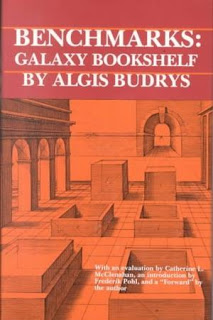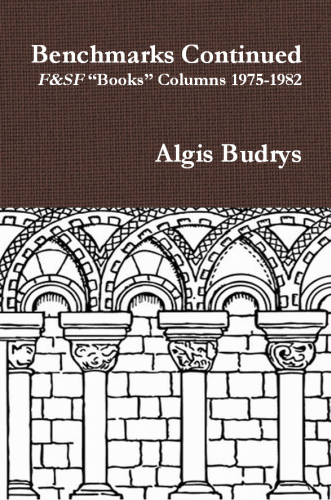

Todd Mason enticed me to buy Benchmarks: Galaxy Bookshelf (1985) and Benchmarks Continued: F&SF “Books” Columns 1975-1982 (2013). I read these science fiction book review columns when they were originally published. Algis Budrys’ reviews always inform and entertain. Rereading Budrys’ reaction to Harlan Ellison’s Dangerous Visions (1968) or Poul Anderson’s Flannery of Terra (1966) reveal canny assessments. The new edition of Budrys’ F&SF reviews continues to explore the key SF novels of those years. Hopefully, more volumes of Budrys’ reviews will be published (two more volumes are planned). I consider John Clute to be the best SF critic followed closely by Barry N. Malzberg. But Algis Budrys’ reviews deserve to be read by those who care about science fiction.
As always George, thanks for expanding my horizons – I had no idea his criticism was collected not once but twice – sounds really great. Ellison of course had a huge falling out with Budrys so fascinating that you mention DANGEROUS VISION – thanks again.
Sergio, all the credit goes to Todd Mason. He motivated me to buy these fascinating collections. I think the cause of Ellison and Budrys’ falling out was Scientology.
George–the two remaining volumes that Pickersgill and Langford have put together, gathering the balance of Budrys’s F&SF columns, were published on 1 July, so await you. Sergio, you should seek those and NON-LITERARY INFLUENCES IN SCIENCE FICTION…and the science fiction issue of TRIQUARTERLY, issue 49 (1980), with Budrys’s long essay “Paradise Charted” (you’ll also find a notable, if comparatively slight, nf piece by Thomas Disch in that issue, along with much else of interest–Robert Onopa was one of the editors of TQ then, and the key editorial staff was purged from their posts in large part to the hostility of some imbeciles toward the direction the editors were taking the magazine, and particularly for having Mere sf writers play so important a part of an issue)…and Budrys’s instructional WRITING TO THE POINT, if you’d like a good slice of his published nonfiction.
Without treading too much into the private lives of others I don’t and didn’t know too well personally, the key snapping point between Budrys and Ellison was over Ellison’s treatment by his bosses at Regency Books, who hired Budrys to replace Ellison as their editor, Budrys stating later he was given to understand he was there to help Ellison out while the latter was flailing (going through a divorce and otherwise not having the best time of it), Ellison recalling later that Budrys didn’t actually confer with HE about the matter and felt AB was backstabbing him. All this in the earliest 1960s, and Ellison and Earl Kemp (who was William Hamling’s associate in most of his publishing work at Regency and elsewhere for a decade or so) have only patched up their differences in the last year or so. Budrys’s involvement with Bridge Publications, the book publishing arm of the Church of Scientology, and AB’s getting paid a steady salary to funnel some CoS money into sf and fantasy writers’ workshops and such (with the sought benefit to the CoS of good publicity, of course), was a quarter-century after all that.
I’d say Budrys at his frequent best was an even better critic, in at least a few ways, than even such geniuses (and fellow F&SF reviewers) as Joanna Russ, Damon Knight, James Blish (Knight and Blish being his primary models when he started), Clute and Malzberg and Avram Davidson…but by the end of his tenure at both GALAXY and F&SF, he wasn’t as enthusiastic about the task and it showed (Blish also, in part for health reasons, could nod at times as well; Russ also had health distractions).
I saw this on Todd’s blog too, but wasn’t moved to buy them, mostly because I wasn’t sure I’d ever get around to reading them, though they sound really interesting. Those who know me or have heard me say this before will recall that I was pretty much an Astounding reader and fan, though I did occasionally pick up F&SF or Galaxy. I wonder if anyone would ever put together a collection of P. Schyler Miller’s reviews. I doubt Todd places him very high, since he didn’t mention him in the comment above.
Budrys’ columns are well worth reading, Rick. You (or anybody else who loves SF) would find hours of delight in these pages!
I think of Miller and Judith Merril and Groff Conklin (whom, it should be noted, was hobbled by the buyer’s guide approach H.L. Gold thrust upon him for his GALAXY columns) as in the next rank…they didn’t do brilliant criticism, but solid, honest and informed reviewing. Merril and Conklin did better as editors, and Merril’s best fiction is pretty damned impressive (Miller’s too, though there wasn’t much of it). Budrys began his career as an acolyte of ASTOUNDING’s John W. Campbell, who was his most important editor in his early career.
Todd, some “critics” merely give opinions. Great critics like John Clute and Barry N. Malzberg enlighten and entertain, too.
Do I feel my arm being twisted? Let’s see, there are four of them?
Okay, so I go looking. No copies of Benchmarks Continued: F&SF “Books” Columns 1975-1982 except one priced in the $100s. I have no idea what the newer books are titles, and a search for the editors comes up blank. Rats.
…and the library doesn’t have them…
Rick, I’m not sure what you saw, but the list price for the first F&SF volume is $20:
http://www.lulu.com/shop/algis-budrys/benchmarks-continued-1975-1982/paperback/product-21087665.html;jsessionid=F20FE14BAE76E98188C27D8A746786A1#ratingsReview
or go to the ANSIBLE EDITIONS page for greater ease:
http://ae.ansible.co.uk/?id=titles
(or this page for Mason egoboo: http://ae.ansible.co.uk/?id=titles/benchcont1rev )
Two interesting quotations:
“There have been three fathers of sf criticism, Damon Knight, James Blish, and A J Budrys. More than any of their heirs, they knew sf inside out, from the 1940s onward. They all wrote well, and more than well. AJ also wrote vastly: authoritative, loose, sharp, casual, tough; and with all the past at his command. He told us everything he could. This 460,000 word trilogy is only a part of that gift. Feast well. We shall see nothing of its like ever again.”
–John Clute, 2013
from an interview posted 13 October 2010 at Locus Online:
I did a body of work which represented my best possibility, and some of that could not have been done by anyone else. [Critic, fiction-writer, editor and writing teacher Algis] Budrys could have done [critical volume] Breakfast in the Ruins better, but he didn’t do it at all. Phil Klass [who wrote most of his usually sharply satiric sf as “William Tenn”] could have done Herovit’s World better, but he didn’t. And I think it had to be done.
–Barry Malzberg
Todd, thank you very much!
And here’s an early Budrys essay for you:
http://www.tangentonline.com/articles-columnsmenu-284/528-about-something-truly-wonderful
from F&SF, 1961, as Budrys was withdrawing from SF…not permanently, but for a while.
Todd, thanks for the link! BENCHMARKS REVISITED and BENCHMARKS CONCLUDED just arrived! I love dipping into them!